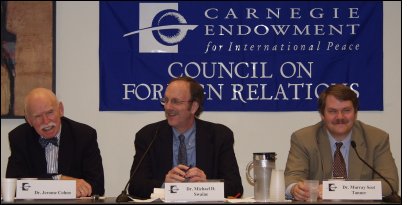Registration
You will receive an email confirming your registration.
About the Panelists
Jerome A. Cohen is Senior Fellow for Asia, Council on Foreign Relations; a law professor at New York University School of Law; and is of counsel to the international law firm of Paul, Weiss, Rifkind, Wharton & Garrison. Mr. Cohen specializes in the international legal problems of East Asia.
Mr. Cohen formerly served as Professor, Director of East Asian Legal Studies and Associate Dean at Harvard Law School. At New York University Law School, he teaches courses on "Legal Problems of Doing Business With East Asia" and "International Law - East and West". He has published several books and many articles on Chinese law as well as a general book, "China Today," co-authored with his wife, Joan Lebold Cohen. In 1990 he published "Investment Law and Practice in Vietnam", with the cooperation of N.N.Bich of the Paul, Weiss office in Ho Chi Minh City and Ta Van Tai.
Mr. Cohen was Visiting Professor of Law at Doshisha University in Kyoto in 1971-72 and Honorary Professor of Law at the University of Hong Kong in 1979. The Cohens lived in Beijing during 1979-81, while Mr. Cohen took part in various trade and investment contract negotiations and taught a course on international business law, in the Chinese language, for Beijing officials. Mr. Cohen is Advisor to the Government of Sichuan Province, China; Chairman of the American Arbitration Association's China Conciliation Committee; a member of the Panel of Arbitrators of both the China International Economic and Trade Arbitration Commission and the China Securities Regulatory Commission in Beijing; a Trustee of the China Institute; and a Director of the National Committee on U.S.-China Relations. He formerly served as Chairman of the New York/Beijing Friendship (Sister City) Committee; a Trustee of The Asia Society; a Corporate Director of the Japan Society; Trustee of the Carnegie Endowment for International Peace; the Vice Chairman of the Advisory Council for The Johns Hopkins-Nanjing University Joint Center in China and a member of the Board of Editors of both the China Quarterly and the American Journal of International Law. He continues to serve on the Advisory Board of Human Rights Watch - Asia.
Mr. Cohen is a Phi Beta Kappa graduate of Yale College (B.A. 1951). He spent the academic year 1951-52 as a Fulbright Scholar in France and was graduated in 1955 from Yale Law School, where he was Editor-in-Chief of the Yale Law Journal and Order of the Coif. He was Law Secretary to Chief Justice Earl Warren of the United States Supreme Court in 1955 Term and Law Secretary to Justice Felix Frankfurter of the Supreme Court in 1956 Term. He subsequently practiced law, served as an Assistant U.S. Attorney for the District of Columbia and was consultant to the U.S. Senate Committee on Foreign Relations before beginning an academic career at the University of California School of Law at Berkeley in 1959. He moved to Harvard Law School in 1964 and remained a faculty member there until he joined Paul, Weiss in 1981. He is a member of the bar in New York, Connecticut and the District of Columbia.
Murray Scot Tanner recently joined the RAND Corporation as a Senior Political Scientist after 13 years as Professor of Political Science at Western Michigan University. Dr. Tanner has written extensively on Chinese and East Asian politics, in particular on the dilemmas of building the rule of law, policing and internal security, political instability and unrest, lawmaking, human rights and leadership politics. He is the author of The Politics of Lawmaking in Post-Mao China: Institutions, Processes, and Democratic Prospects (Oxford University Press, 1998), editor and contributor to China's Think Tanks: Windows on a Changing China (2001), and a forthcoming monograph Who Wields the Knife? An Historical-Institutional Analysis of Chinese Communist Police and Intelligence Organs, 1927-1950; also "Shackling the Coercive State: China's Ambivalent Struggle Against Torture", Problems of Post-Communism, Sept./Oct. 2000; "Cracks in the Wall: China's Eroding Coercive State", Current History, Sept. 2002; and "Hu Jintao's Succession: Prospects and Challenges" in David M. Finkelstein and Maryanne Kivlehan, eds., China's Leadership in the Twenty-first Century (M. E. Sharpe, 2002). His articles have also appeared in such journals as Comparative Politics, The China Quarterly, The China Journal, and others.
